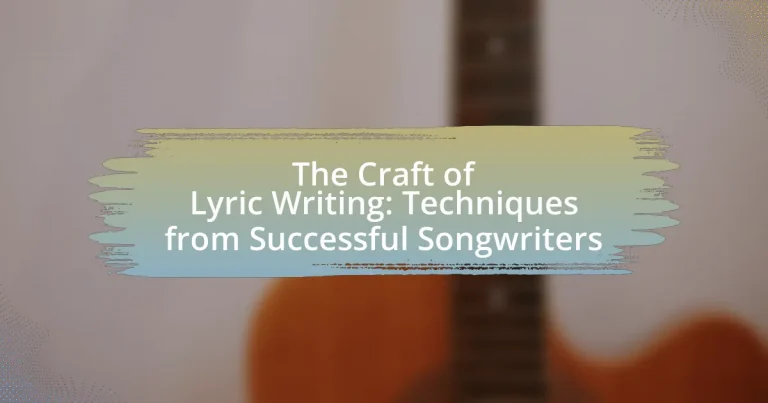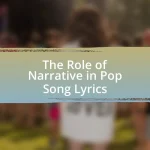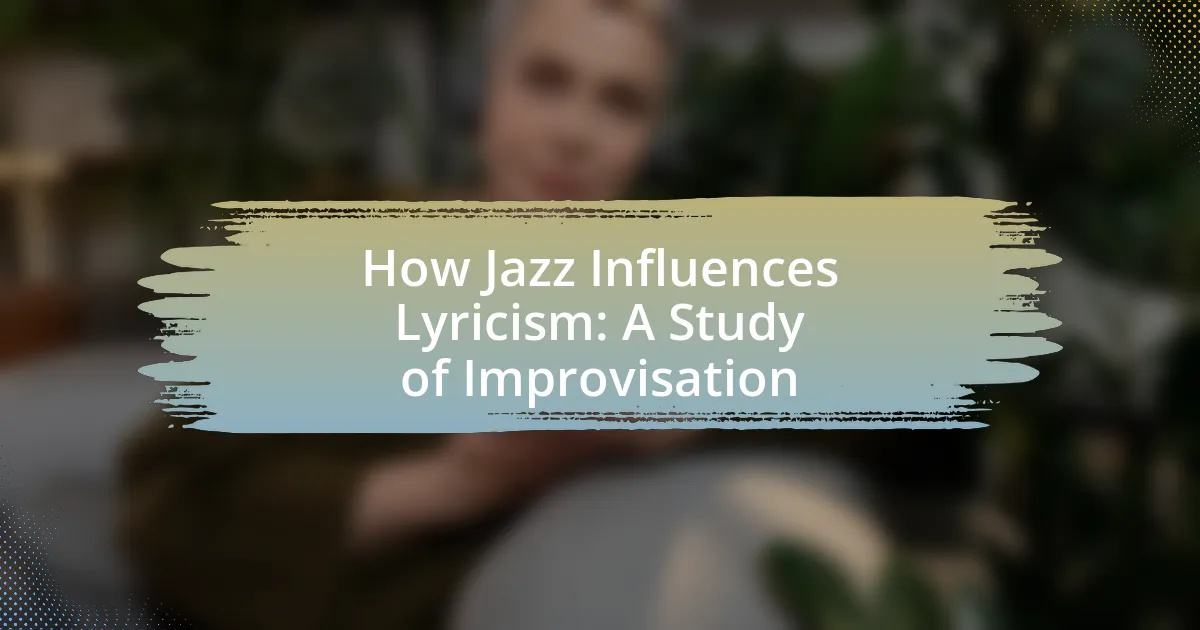The article focuses on the craft of lyric writing, emphasizing the techniques and approaches used by successful songwriters. It explores the importance of authenticity, emotional resonance, and storytelling in creating impactful lyrics, highlighting fundamental elements such as imagery, narrative structure, and rhyme schemes. The article also addresses common challenges in lyric writing, offers practical tips for improvement, and discusses the benefits of collaboration and feedback. Additionally, it provides insights into how songwriters can develop their unique voice and overcome obstacles like writer’s block and self-doubt.

What is the Craft of Lyric Writing?
The craft of lyric writing involves the skillful composition of words to create meaningful and emotive song lyrics. This process requires an understanding of rhythm, rhyme, and storytelling, allowing songwriters to convey emotions and narratives effectively. Successful lyricists often draw from personal experiences and observations, using vivid imagery and relatable themes to connect with listeners. For instance, Bob Dylan’s lyrics often reflect social issues and personal introspection, showcasing how powerful storytelling can resonate with audiences.
How do successful songwriters approach lyric writing?
Successful songwriters approach lyric writing by prioritizing authenticity and emotional resonance. They often draw from personal experiences, ensuring that their lyrics reflect genuine feelings and relatable narratives. For instance, Taylor Swift frequently incorporates autobiographical elements into her songs, which enhances listener connection and engagement. Additionally, successful songwriters utilize structured techniques such as storytelling, imagery, and rhyme schemes to craft compelling lyrics. Research indicates that effective lyric writing often involves a balance of creativity and technical skill, allowing songwriters to convey complex emotions succinctly while maintaining listener interest.
What are the fundamental elements of effective lyrics?
The fundamental elements of effective lyrics include strong imagery, emotional resonance, a clear narrative, and rhythmic structure. Strong imagery engages listeners by painting vivid pictures in their minds, while emotional resonance connects the audience to the song’s themes and feelings. A clear narrative provides a storyline that listeners can follow, enhancing their engagement. Additionally, rhythmic structure ensures that the lyrics flow well with the music, making them memorable and singable. These elements are supported by successful songwriters who emphasize the importance of storytelling and emotional connection in their work, as seen in the lyrics of iconic songs across various genres.
How do emotions play a role in lyric writing?
Emotions are fundamental in lyric writing as they drive the thematic content and resonance of the song. Lyricists often draw from personal experiences and feelings to create relatable narratives, which enhances listener engagement. For instance, research indicates that songs expressing strong emotions, such as love or heartbreak, tend to achieve higher popularity and emotional connection with audiences. A study published in the Journal of Popular Music Studies highlights that emotionally charged lyrics can evoke empathy and reflection, making them more impactful. Thus, emotions not only shape the creative process but also significantly influence the effectiveness of the lyrics in connecting with listeners.
Why is lyric writing considered an art form?
Lyric writing is considered an art form because it combines creativity, emotional expression, and linguistic skill to convey complex ideas and feelings through structured language. Successful lyricists utilize techniques such as metaphor, imagery, and rhythm to create impactful narratives that resonate with listeners. For instance, Bob Dylan’s lyrics often employ vivid imagery and social commentary, demonstrating how words can evoke deep emotional responses and provoke thought. This artistic approach to language elevates lyric writing beyond mere words, making it a significant form of artistic expression in music.
What distinguishes great lyrics from mediocre ones?
Great lyrics are distinguished from mediocre ones by their emotional depth, originality, and ability to connect with listeners on a personal level. Emotional depth allows lyrics to resonate, as seen in songs like “Hallelujah” by Leonard Cohen, which evokes profound feelings through vivid imagery and relatable themes. Originality sets great lyrics apart, as they often present unique perspectives or storytelling techniques, exemplified by Bob Dylan’s “Like a Rolling Stone,” which broke conventional songwriting molds. Additionally, the ability to create memorable hooks and clever wordplay enhances listener engagement, as demonstrated in Taylor Swift’s “Blank Space,” where catchy phrases and relatable scenarios draw in audiences. These elements combined contribute to the lasting impact and artistic merit of great lyrics compared to their mediocre counterparts.
How does storytelling enhance lyric writing?
Storytelling enhances lyric writing by providing a structured narrative that engages listeners emotionally and intellectually. When songwriters incorporate storytelling elements, they create relatable characters and situations, which can evoke empathy and connection. For instance, songs like “The River” by Bruce Springsteen illustrate personal struggles through vivid storytelling, allowing listeners to immerse themselves in the narrative. This technique not only makes the lyrics more memorable but also deepens the overall impact of the song, as evidenced by the fact that songs with strong narratives often achieve greater commercial success and critical acclaim.
What techniques do successful songwriters use?
Successful songwriters use techniques such as storytelling, emotional resonance, and strong hooks to create impactful lyrics. Storytelling allows songwriters to engage listeners by crafting narratives that evoke emotions and connect on a personal level. Emotional resonance is achieved through relatable themes and vivid imagery, which help listeners to feel the song’s message deeply. Strong hooks, often characterized by catchy melodies or memorable phrases, ensure that the song remains in the listener’s mind. These techniques are supported by research indicating that songs with strong narratives and emotional depth tend to have higher listener engagement and retention rates.
How do rhyme schemes influence the flow of lyrics?
Rhyme schemes significantly influence the flow of lyrics by creating patterns that enhance musicality and memorability. These patterns guide the listener’s expectations, allowing for smoother transitions between lines and verses. For instance, a consistent AABB rhyme scheme can establish a rhythmic predictability that makes the lyrics easier to follow and sing along with. Research indicates that songs with structured rhyme schemes are often perceived as more engaging and enjoyable, as they facilitate a natural cadence that aligns with the melody. This structural element not only aids in the lyrical delivery but also contributes to the overall emotional impact of the song.
What role does imagery play in creating memorable lyrics?
Imagery plays a crucial role in creating memorable lyrics by evoking vivid mental pictures that resonate with listeners. This technique enhances emotional connection, allowing audiences to visualize and feel the experiences conveyed in the song. For instance, songs like “Firework” by Katy Perry utilize imagery to inspire and uplift, making the lyrics more impactful and relatable. Research indicates that lyrics rich in imagery are more likely to be remembered, as they engage multiple senses and create lasting impressions.

How can lyric writing techniques be applied?
Lyric writing techniques can be applied by utilizing methods such as storytelling, imagery, and emotional resonance to create compelling and relatable songs. Successful songwriters often incorporate narrative structures to engage listeners, using vivid imagery to evoke emotions and paint a picture in the audience’s mind. For instance, Bob Dylan’s use of storytelling in songs like “Tangled Up in Blue” illustrates how a narrative can enhance lyrical depth. Additionally, employing techniques like rhyme schemes and meter can improve the musicality of lyrics, making them more memorable and impactful. These methods are supported by studies in music theory that highlight the importance of structure and emotional connection in songwriting.
What are the steps to develop a unique lyrical style?
To develop a unique lyrical style, a songwriter should follow these steps: first, analyze and identify personal influences and inspirations, which helps in understanding one’s own voice. Next, experiment with various lyrical structures and themes, allowing for creative exploration and innovation. Additionally, practice writing regularly to refine skills and develop a distinct rhythm and flow. Collaborating with other artists can also provide new perspectives and ideas, further enhancing originality. Lastly, seek feedback from trusted sources to gain insights and make necessary adjustments, ensuring the lyrical style remains authentic and unique. These steps are supported by successful songwriters who emphasize the importance of personal expression and continuous practice in their craft.
How can songwriters find their voice in lyrics?
Songwriters can find their voice in lyrics by engaging in self-reflection and experimenting with different writing styles. Self-reflection allows songwriters to explore their personal experiences, emotions, and beliefs, which can lead to authentic and relatable lyrics. For instance, successful songwriters like Taylor Swift often draw from their own life stories, creating a unique voice that resonates with listeners. Experimenting with various genres and lyrical structures also helps songwriters discover what feels most natural and expressive for them. This approach is supported by the fact that many acclaimed songwriters emphasize the importance of authenticity and personal connection in their work, leading to a distinctive lyrical voice.
What exercises can help improve lyric writing skills?
To improve lyric writing skills, engaging in specific exercises such as free writing, rewriting existing lyrics, and using prompts can be highly effective. Free writing involves setting a timer and writing continuously without self-editing, which fosters creativity and helps generate new ideas. Rewriting existing lyrics allows writers to analyze structure, rhyme, and rhythm, enhancing their understanding of effective lyricism. Additionally, using prompts, such as a specific theme or emotion, encourages focused creativity and can lead to unique lyrical concepts. These exercises are supported by the practice of many successful songwriters who emphasize the importance of consistent writing and experimentation in their craft.
How do collaboration and feedback enhance lyric writing?
Collaboration and feedback significantly enhance lyric writing by introducing diverse perspectives and constructive criticism. When songwriters collaborate, they combine their unique experiences and ideas, leading to richer and more varied lyrical content. For instance, a study by the University of Southern California found that collaborative songwriting often results in more innovative and commercially successful songs, as different viewpoints can spark creativity and inspire new directions in the writing process. Additionally, feedback from peers allows lyricists to refine their work, identify weaknesses, and strengthen their message, ultimately leading to more impactful and resonant lyrics.
What are the benefits of co-writing with other songwriters?
Co-writing with other songwriters enhances creativity and broadens perspectives. Collaborating allows songwriters to combine diverse ideas, leading to innovative concepts and richer lyrical content. Research indicates that collaboration can increase the quality of the final product, as seen in the success of numerous hit songs created by songwriting teams, such as those in the Brill Building era, where partnerships like Carole King and Gerry Goffin produced iconic tracks. Additionally, co-writing fosters skill development, as songwriters can learn from each other’s techniques and approaches, ultimately improving their craft.
How can constructive criticism improve lyrical content?
Constructive criticism can significantly improve lyrical content by providing specific feedback that highlights strengths and identifies areas for enhancement. This feedback allows songwriters to refine their ideas, enhance emotional resonance, and ensure clarity in their messages. For instance, a study published in the Journal of Creative Behavior found that receiving targeted feedback can lead to increased creativity and better overall quality in artistic endeavors, including songwriting. By incorporating constructive criticism, lyricists can create more impactful and relatable lyrics, ultimately elevating their work.

What are common challenges in lyric writing?
Common challenges in lyric writing include finding the right words to convey emotions, maintaining originality, and ensuring lyrical coherence. Writers often struggle with expressing complex feelings succinctly while avoiding clichés, which can dilute the impact of their message. Additionally, balancing rhyme and rhythm with meaningful content poses a significant hurdle, as song structure demands both creativity and technical skill. Research indicates that many songwriters face these issues, as highlighted in the book “Writing Better Lyrics” by Pat Pattison, which emphasizes the importance of clarity and emotional resonance in effective lyricism.
How can songwriters overcome writer’s block?
Songwriters can overcome writer’s block by employing techniques such as setting a routine, changing their environment, and using prompts. Establishing a consistent writing schedule helps create a habit, making it easier to generate ideas. Changing the environment can stimulate creativity; for instance, writing in a different location can provide new perspectives. Additionally, using prompts, such as random words or phrases, can spark inspiration and lead to new lyrical ideas. Research indicates that engaging in varied creative activities can enhance overall creativity, which supports these methods for overcoming writer’s block.
What techniques can help spark creativity in lyric writing?
Techniques that can help spark creativity in lyric writing include free writing, brainstorming, and using prompts. Free writing encourages writers to express thoughts without self-censorship, allowing for the emergence of unique ideas. Brainstorming, whether individually or in groups, fosters collaboration and the generation of diverse concepts. Utilizing prompts, such as specific themes or phrases, can also stimulate inspiration and guide the writing process. These methods are supported by studies indicating that creative exercises enhance cognitive flexibility, which is crucial for artistic expression.
How can songwriters deal with self-doubt in their lyrics?
Songwriters can deal with self-doubt in their lyrics by embracing vulnerability and using it as a source of inspiration. Acknowledging feelings of insecurity allows songwriters to create authentic and relatable content, which resonates with listeners. Research indicates that artists who express their emotions openly often produce more impactful work, as seen in studies on emotional expression in creative processes. By transforming self-doubt into a narrative element, songwriters can enhance their lyrical depth and connect more profoundly with their audience.
What pitfalls should songwriters avoid?
Songwriters should avoid clichés, as they can make lyrics feel unoriginal and uninspired. Using overused phrases or ideas can lead to a lack of emotional impact and connection with the audience. Additionally, songwriters should steer clear of excessive complexity in lyrics, which can confuse listeners and dilute the song’s message. Simplicity often resonates more effectively. Another pitfall is neglecting the importance of melody; strong lyrics need to be paired with a compelling melody to enhance their appeal. Lastly, songwriters should avoid writing solely for commercial success, as this can compromise authenticity and creativity, leading to work that feels forced rather than genuine.
How can clichés weaken the impact of lyrics?
Clichés weaken the impact of lyrics by making them predictable and unoriginal. When songwriters rely on overused phrases, they fail to evoke strong emotions or create a unique connection with the audience. This predictability diminishes the listener’s engagement, as they may find the lyrics less relatable or memorable. Research indicates that originality in songwriting is crucial for emotional resonance; for instance, a study published in the Journal of Popular Music Studies highlights that innovative lyrics are more likely to be remembered and appreciated by listeners. Therefore, the use of clichés can significantly detract from the overall effectiveness of a song.
What are the dangers of overcomplicating lyrics?
Overcomplicating lyrics can lead to confusion and disengagement from the audience. When lyrics are overly intricate, listeners may struggle to grasp the intended message or emotional resonance, resulting in a disconnect. Research indicates that songs with clear and relatable lyrics tend to perform better commercially, as evidenced by a study published in the Journal of Popular Music Studies, which found that simplicity in lyrics correlates with higher listener retention and enjoyment. Therefore, while artistic expression is important, maintaining clarity is crucial for effective communication in songwriting.
What practical tips can enhance lyric writing skills?
To enhance lyric writing skills, songwriters should practice writing regularly, as consistent practice leads to improvement. Engaging in daily writing exercises, such as free writing or setting specific themes, helps develop creativity and fluency. Additionally, studying successful song lyrics can provide insights into structure, rhyme schemes, and emotional resonance, which are essential components of effective lyrics. Analyzing the work of renowned songwriters like Bob Dylan or Joni Mitchell reveals techniques such as storytelling and vivid imagery that can inspire new approaches. Furthermore, collaborating with other musicians can introduce fresh perspectives and ideas, fostering a more dynamic writing process.
How can daily writing habits improve lyric quality?
Daily writing habits can significantly improve lyric quality by fostering creativity, enhancing vocabulary, and refining lyrical structure. Regular practice allows songwriters to explore diverse themes and styles, leading to more innovative and relatable lyrics. Studies indicate that consistent writing can increase fluency and confidence, enabling writers to express their thoughts more clearly and effectively. For instance, a study published in the Journal of Creative Behavior found that daily writing exercises can enhance creative output and improve overall writing skills. This consistent engagement with the craft ultimately results in higher-quality lyrics that resonate with audiences.
What resources are available for aspiring lyricists?
Aspiring lyricists can access a variety of resources to enhance their craft, including online courses, songwriting workshops, and lyric writing books. Online platforms like Coursera and MasterClass offer courses taught by successful songwriters, providing structured learning and insights into the songwriting process. Additionally, local community colleges and music schools often host workshops that allow lyricists to collaborate and receive feedback from peers and instructors. Books such as “Writing Better Lyrics” by Pat Pattison and “The Complete Singer-Songwriter” by Jeffrey Pepper Rodgers provide practical techniques and exercises to refine lyric writing skills. These resources collectively support aspiring lyricists in developing their abilities and understanding the nuances of effective songwriting.





